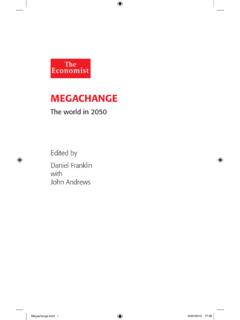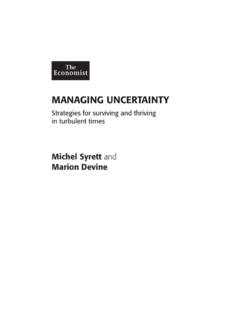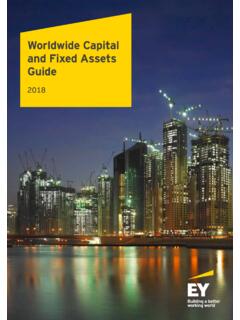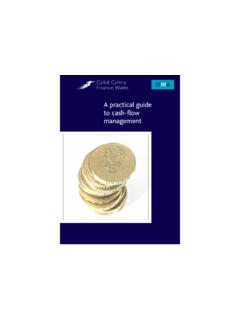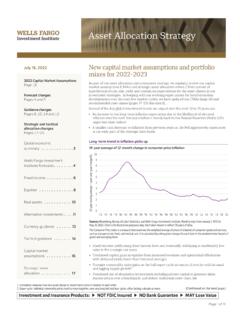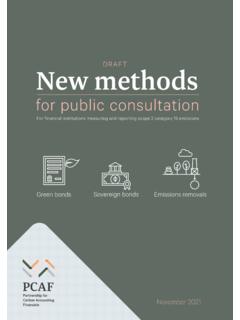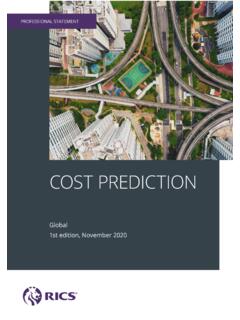Transcription of Guide to Financial Markets - The Economist
1 Guide to Financial MarketsGuide to Financial 123/10/2013 14:14other Economist booksGuide to Analysing CompaniesGuide to Business ModellingGuide to Business PlanningGuide to Cash ManagementGuide to CommoditiesGuide to Decision MakingGuide to Economic IndicatorsGuide to Emerging MarketsGuide to the European UnionGuide to Financial ManagementGuide to Hedge FundsGuide to Investment StrategyGuide to Management Ideas and GurusGuide to Managing GrowthGuide to Organisation DesignGuide to Project ManagementGuide to Supply Chain ManagementNumbers GuideStyle GuideBook of Business Quotations Book of Isms Book of ObituariesBrands and BrandingBusiness ConsultingBusiness StrategyBuying Professional ServicesDoing Business in ChinaEconomicsManaging TalentManaging UncertaintyMarketingMarketing for GrowthMegachange the world in 2050 Modern Warfare, Intelligence and DeterrenceOrganisation CultureSuccessful Strategy ExecutionThe World of BusinessDirectors: an A Z GuideEconomics: an A Z GuideInvestment: an A Z GuideNegotiation: an A Z Guide Pocket World in FiguresGuide to Financial 229/10/2013 14:40 Guide to Financial MarketsWhy they exist and how they workSixth editionMarc levinson Guide to Financial 329/10/2013 16:52 THE Economist IN ASSOCIATION WITH PROFILE BOOKS LTDP ublished by Profile Books Ltd 3a Exmouth HousePine StreetLondon ec1r The Economist Newspaper Ltd, 1999, 2000, 2002, 2006, 2010, 2014 Text copyright Marc Levinson, 2014 All rights reserved.
2 Without limiting the rights under copyright reserved above, no part of this publication may be reproduced, stored in or introduced into a retrieval system, or transmitted, in any form or by any means (electronic, mechanical, photocopying, recording or otherwise), without the prior written permission of both the copyright owner and the publisher of this greatest care has been taken in compiling this book. However, no responsibility can be accepted by the publishers or compilers for the accuracy of the information presented. Where opinion is expressed it is that of the author and does not necessarily coincide with the editorial views of The Economist every effort has been made to contact copyright-holders of material produced or cited in this book, in the case of those it has not been possible to contact successfully, the author and publishers will be glad to make amendments in further in EcoType by MacGuru Ltd in Great Britain by Clays, Bungay, SuffolkA CIP catalogue record for this book is available from the British Library Hardback isbn: 978 1 78125 106 5 Paperback isbn: 978 1 78125 107 2e-book isbn: 978 1 84765 953 8 The paper this book is printed on is certified by the 1996 Forest Stewardship Council (FSC).
3 It is ancient-forest friendly. The printer holds FSC chain of custody SGS-COC-2061 Guide to Financial 429/10/2013 14:431 Why Markets matter 12 Foreign-exchange Markets 173 Money Markets 444 Bond Markets 705 Securitisation 1116 International fixed-income Markets 1377 Equity Markets 1548 Futures and options Markets 1979 Derivatives Markets 253 Index 275 ContentsGuide to Financial 523/10/2013 14:14 Guide to Financial 623/10/2013 14:141 Why Markets matterThe euro is slighTly higher against the yen. The Dow Jones Industrial Average is off 18 points in active trading. A Chinese airline loses millions of dollars with derivatives. Following the Bank of England s decision to lower its base rate, monthly mortgage payments are set to these events are examples of Financial Markets at work. That Markets exercise enormous influence over modern life comes as no news.
4 But although people around the world speak glibly of Wall Street , the bond market and the currency Markets , the meanings they attach to these time-worn phrases are often vague and usually out of date. This book explains the purposes different Financial Markets serve and clarifies the way they work. It cannot tell you whether your investment portfolio is likely to rise or to fall in value. But it may help you understand how its value is determined, and how the different securities in it are created and the beginningThe word market usually conjures up an image of the bustling, paper-strewn floor of the New York Stock Exchange or of traders motioning frantically in the futures pits of Chicago. These images themselves are out of date, as almost all of the dealing once done face to face is now handled computer to computer, often with minimal human intervention.
5 And formal exchanges such as these are only one aspect of the Financial Markets , and far from the most important one. There were Financial Markets long before there were exchanges and, in fact, long before there was organised trading of any to Financial 123/10/2013 14:142 Guide To Financial markeTsFinancial Markets have been around ever since mankind settled down to growing crops and trading them with others. After a bad harvest, those early farmers would have needed to obtain seed for the next season s planting, and perhaps to get food to see their families through. Both of these transactions would have required them to obtain credit from others with seed or food to spare. After a good harvest, the farmers would have had to decide whether to trade away their surplus immediately or to store it, a choice that any 21st-century commodities trader would find familiar.
6 The amount of fish those early farmers could obtain for a basket of cassava would have varied day by day, depending upon the catch, the harvest and the weather; in short, their exchange rates were independent decisions of all of those farmers constituted a basic Financial market , and that market fulfilled many of the same purposes as Financial Markets do do Markets do? Financial Markets take many different forms and operate in diverse ways. But all of them, whether highly organised, like the London Stock Exchange, or highly informal, like the money changers on the street corners of some African cities, serve the same basic functions. Price setting. The value of an ounce of gold or a share of stock is no more, and no less, than what someone is willing to pay to own it. Markets provide price discovery, a way to determine the relative values of different items, based upon the prices at which individuals are willing to buy and sell them.
7 asset valuation. market prices offer the best way to determine the value of a firm or of the firm s assets, or property. This is important not only to those buying and selling businesses, but also to regulators. An insurer, for example, may appear strong if it values the securities it owns at the prices it paid for them years ago, but the relevant question for judging its solvency is what prices those securities could be sold for if it needed cash to pay claims to Financial 223/10/2013 14:14 Why Markets matter 3 Arbitrage. In countries with poorly developed Financial Markets , commodities and currencies may trade at very different prices in different locations. As traders in Financial Markets attempt to profit from these divergences, prices move towards a uniform level, making the entire economy more efficient. Raising capital. Firms often require funds to build new facilities, replace machinery or expand their business in other ways.
8 Shares, bonds and other types of Financial instruments make this possible. The Financial Markets are also an important source of capital for individuals who wish to buy homes or cars, or even to make credit-card purchases. Commercial transactions. As well as long-term capital, the Financial Markets provide the grease that makes many commercial transactions possible. This includes such things as arranging payment for the sale of a product abroad, and providing working capital so that a firm can pay employees if payments from customers run late. Investing. The stock, bond and money Markets provide an opportunity to earn a return on funds that are not needed immediately, and to accumulate assets that will provide an income in future. Risk management. Futures, options and other derivatives contracts can provide protection against many types of risk, such as the possibility that a foreign currency will lose value against the domestic currency before an export payment is received.
9 They also enable the Markets to attach a price to risk, allowing firms and individuals to trade risks so they can reduce their exposure to some while retaining exposure to size of the marketsEstimating the overall size of the Financial Markets is difficult. It is hard in the first place to decide exactly what transactions should be included under the rubric Financial Markets , and there is no way to compile complete data on each of the millions of sales and purchases occurring each year. Total capital market financing was approximately Guide to Financial 323/10/2013 14:144 Guide To Financial Markets $ trillion worldwide in 2011, excluding purely domestic loans that were not resold in the form of securities (see Table ).Table Amounts raised in Financial Markets Net of repayments, $bn20002004200620082011 International bank loans7141,3432,816 1,279185 International bonds and notes1,1481,5602,6172,4361,212 International money- market instruments876116882 6 Domestic bonds and notes8652,4612,3222,2822,566 Domestic money- market instruments3777749831,462 611 International equity issues318214371392485 Domestic equity issues901593717999617 Total excluding domestic loans4,4107,0069,9946,3744,448sources: Bank for International Settlements; World Federation of Exchanges; Thomson ReutersThe figure of $ trillion for 2011, sizeable as it is, represents only a single year s activity.
10 Another way to look at the Markets is to estimate the value of all the Financial instruments they trade. When measured in this way, the Financial Markets accounted for $180 trillion of capital in 2011 (see Table ). This figure excludes many important Financial activities, such as insurance underwriting, bank lending to individuals and small businesses, and trading in Financial instruments such as futures and derivatives that are not means of raising capital. If all of these other Financial activities were to be included, the total size of the Markets would be much measureAnother way of measuring the growth of finance is to examine the value of cross-border financing. Cross-border finance is by no means new, and at various times in the past (in the late 19th century, for example) it has been quite large relative to the size of the world economy.

